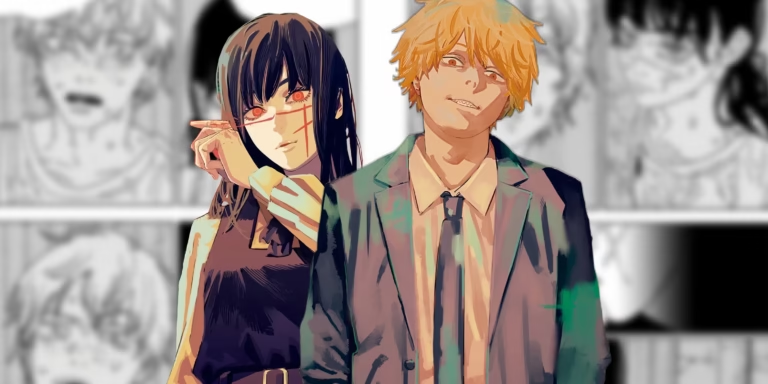Chainsaw Man Chapter 167: Chainsaw Man, created by Tatsuki Fujimoto, has never shied away from confronting readers with unsettling violence, strange humor, and deeply emotional drama. Chapter 167—titled “Super Smooch”—is no exception. In this short but impactful installment, the series dives into themes of consent, identity, desire, and trauma in ways that shock and provoke thoughtful discussion.
Table of Contents
Summary of Chapter 167
In a grim alleyway, Yoru—the War Devil inhabiting the body of Asa Mitaka—finds a discarded piece of trash. She transforms it into a knife using her powers, though she conceals this fact from Denji. She then stares him down and coldly proposes to slice off his sex drive—an offer that unnerves Denji to the core.
Shocked and disturbed by the suggestion, Denji ultimately reneges on the agreement. In retaliation, Yoru shoves her hand down his pants, intending to crush his testicles—an assault that forces Denji into a recoil. But in that moment, a buried memory resurfaces in Yoru’s fragmented consciousness: a kiss she once shared with Denji in his old apartment.
Driven by this resurfaced recollection, Yoru impulsively kisses Denji again. What begins as a violent gesture escalates into an unsettling, confusing moment of intimacy. Denji noticeably ejaculates on Yoru’s hand, blurring the lines between trauma and physical release—all unfolding in Yoru’s cold control of the moment.
Layers of Interpretation: Consent, Identity, and Duality
The chapter pushes readers into disquieting territory. Many highlight how it challenges the notion of consent—Denji doesn’t fully desire what’s happening, and Yoru’s dominance feels predatory rather than mutual. A Reddit user articulates this succinctly:
“Yoru took over her body and essentially raped Denji. … Neither Denji or Asa asked for this to happen.” Reddit
Meanwhile, another commenter reflects on the split nature of Yoru and Asa, hoping for integration and healing:
“Asa and Yoru are effectively the same person … it makes sense for Asa to move past her immature repression of desires … and I hope Fujimoto has them both found a healthier, middle ground.”
This internal duality—embodied in the juxtaposition of Asa (morning) and Yoru (night)—fuels the chapter’s emotional and thematic weight. Asa’s presumably more compassionate side may feel horror and guilt when she regains control of her body, while Yoru’s coldness and aggression play out in disturbing intimacy.
Artistic and Narrative Context
Fujimoto has consistently crafted Chainsaw Man to be emotionally jagged, unsettling, and brutally honest. In just 16 pages, “Super Smooch” interrupts any conventional narrative progression to force readers into confronting discomfort. Its brevity amplifies the emotional slash: one moment, Denji is recoiling in fear; the next, something intimate—yet coercive—is occurring in its stead.
Critics and fans alike stress that Denji’s longstanding yearning for connection, affection, and even basic intimacy—with roots in his loveless upbringing—makes this chapter especially haunting. It is not just sex; it’s a twisted version of the emotional connection he has craved since the beginning.
CBR, for instance, puts it plainly: this is Denji’s first sexual experience—but not with the person he believed he was connecting with. Meanwhile, The Mary Sue blog observed that Fujimoto has used Denji’s trauma so far as a focal point of emotional storytelling, making this unsettling chapter feel like an inevitable landmine in his journey .
What Comes Next—and Why It Matters
Chapter 168 looms with intense consequences. Denji must process what just happened, while Asa (when in control) will confront the aftermath of Yoru’s violent intimacy. This cataclysm within a single body sets up a crisis of identity, trust, and emotional reckoning.
The narrative trajectory hints at a future where Asa and Yoru’s contrasting impulses might either fracture or integrate. Can emotional maturity and self-awareness emerge from a scene drenched in coercion and confusion? Many fans are watching closely, hoping for growth—not just for Denji, but for Asa/Yoru’s internal reconciliation.
Frequently Asked Questions (FAQs)
Q1: What makes Chapter 167 particularly controversial?
Chapter 167 crosses boundaries by depicting intimacy that begins as coercion and shifts into shockingly intimate contact. The lack of consent and the violent context make many readers uneasy.
Q2: Who are Asa and Yoru, and why are there two personas?
In Part Two of Chainsaw Man, Asa Mitaka is a high schooler fused with Yoru—the War Devil. They share a body but have distinct personalities: Asa is sensitive and uncertain, Yoru is cold and aggressive.
Q3: Did Denji consent to what happened?
No. Denji was manipulated into the encounter under violent or coercive circumstances, and the chapter explicitly challenges the notion of consent in intimate situations.
Q4: What was the significance of the kiss?
The kiss triggered a memory buried in Yoru’s mind—hers or Asa’s—linking the moment to a past time with Denji. It contrasts trauma with memory and desire, creating emotional dissonance.
Q5: How long is Chapter 167, and where does it fit in the series?
It’s a short chapter—around 16 pages—embedded in Volume 19 of the Aging Devil Arc, specifically smack in the middle at Chapter 167.
Q6: What themes does this chapter explore?
It explores trauma, sexual desire, consent, identity fragmentation, emotional repression, and the dark interplay between power and intimacy.
Q7: What are fans saying?
Some fans describe the chapter as disturbing, hurtful, or exploitative; others see it as a critical moment of psychological complexity that will shape characters going forward.
Q8: Where can I read Chapter 167 officially?
The chapter is available through official platforms like Viz Media or Manga Plus, within Volume 19 of the manga collection.

